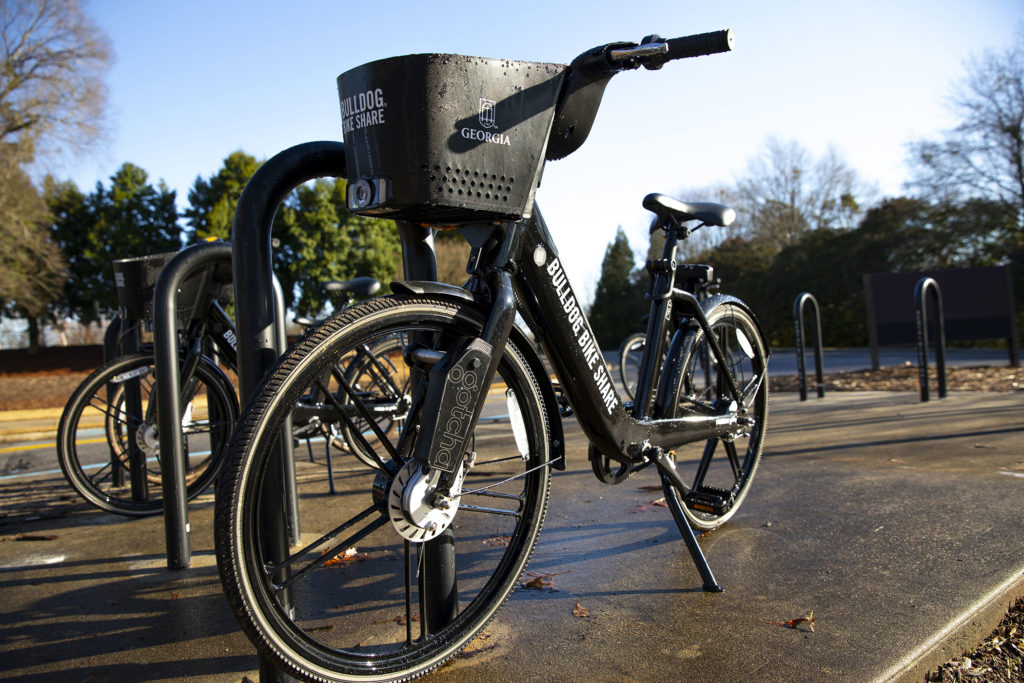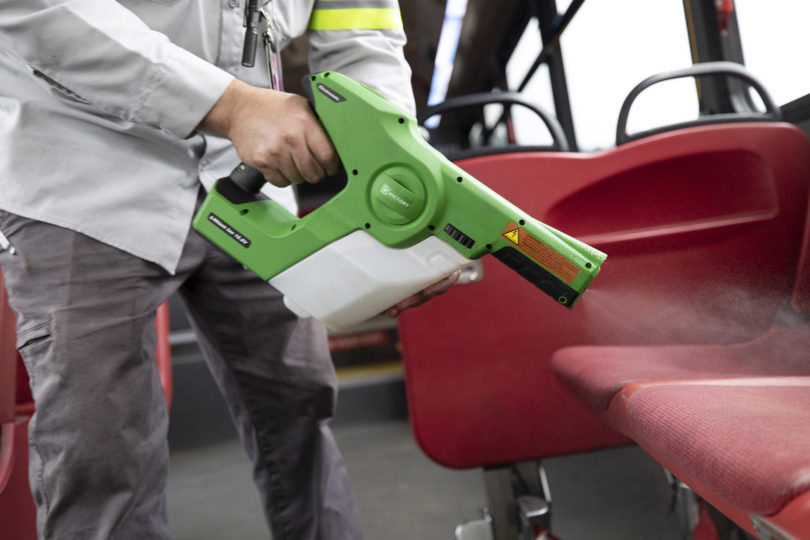The University of Georgia Transportation and Parking Services team has a 17-page checklist of what they are doing to prepare buses and parking services for the return of students in August. And that checklist represents only a portion of what is being done around campus to ready dorms, dining halls and other facilities to ensure a clean and safe environment during the coronavirus pandemic.
Don Walter, the unit’s director, has been working with his team for months on new bus schedules, sanitation procedures, social distancing protocols and touch-free solutions where applicable.
Changing guidelines and new information about the coronavirus create an even more challenging task, but Walter said his team is ready to pivot and change protocols if necessary.
“We’re thinking of everything and we are getting guidance from a lot of government experts. But we know we have to be flexible and adjust as things change weekly,” said Walter. “I am extremely confident that we are going to handle this well.”
In addition to sanitation procedures including new disinfecting sprayers used to sanitize buses each night, protective barriers are being installed for bus drivers, passengers will board via the back entrance of the bus and are required to wear face masks. Occupancy will be reduced in accordance with guidelines from the Centers for Disease Control and Prevention and Federal Transit Administration to ensure social distancing. The number of riders on a bus is subject to change based on these guidelines. Many routes have been shortened to provide quicker and more frequent service through campus which helps offset reduced occupancy. The updated routes may be viewed at tps.uga.edu/routechanges.
Paratransit will only allow one passenger at a time and will have the same robust sanitizing procedures as the buses.
Parking attendants in campus lots will also wear masks when interacting with customers and transactions will be cashless to ensure less contact. Pay meters will still be there for one-time and daily visitors, but they will get frequent routine wipe downs as will stairwell handles and elevator buttons.

Bulldog Bike Share has 22 hubs around campus, including this one at the intramural fields. (Photo by Chad Osburn/UGA)
“We also want to really promote walking and biking on campus,” Walter said. “Bulldog Bike Share is available on campus right now with 22 hubs.” There are 100 bikes total and an app can be used to check one out.
Housing
The residence halls have also been implementing several important changes in preparation for students. The community bathrooms, for example, will be disinfected three times daily instead of once, and housing is providing disinfectant wipes to residents with private or attached bathrooms.
Some furniture is being removed from group gathering spaces to create more space for social distancing, and vinyl stickers will be placed on floors to show the proper 6-foot distance. In addition, more than 1,100 hand sanitizing stations have been added, at every entrance and in every elevator lobby, kitchen, laundry room and study lounge.
Plexiglass barriers have been installed at front desks for protection when people come to check out a key. Floor meetings will take place virtually rather than in person, and no guests will be allowed in student rooms.
“There are a lot of unknowns at this point but we’re strategizing cleaning, programming and distancing approaches, while still offering the community and support that are a core part of our mission,” said Linda Kasper, executive director of University Housing. “Overall, we’re moving forward with every intention of giving students the same positive experience they have come to expect from living on campus.”
Dining
Dining has been preparing for months to ensure students feel comfortable and safe when they return to campus.
Residential dining commons will be open for meal plan customers and have introduced flexible ordering options including ordering online for pick-up with Grubhub, taking a meal to-go, and a reservation system. Dining Services has also implemented safety enhancements including contact-free solutions at the Coca-Cola freestyle machines in retail and residential locations. Those using credit or debit, Paw Points, or Bulldog Bucks to purchase food may do so at our retail dining locations (ex. Chick-fil-A, Starbucks, and Panda Express) which are offering to-go service and Grubhub pick-up.
“It’s going to be challenging, but we’ve always been committed to food safety and sanitation. It’s at the forefront of what we do. We’ll continue to follow all guidelines from the CDC to provide a safe, welcoming environment for the people who choose to come in and dine with us,” said Bryan Varin, executive director of dining services and interim associate director of auxiliary services.
Facilities management
Ralph Johnson, Associate Vice President for the Facilities Management Division, is ensuring the buildings and outside spaces across campus are ready to receive students in August.
The FMD staff has been trained how to clean and disinfect touch surfaces on a regular basis and how to react to areas if a more significant disinfection is required. The chemicals used by FMD are Green Seal certified, and they are proven to kill the coronavirus and meet the requirements of the Centers for Disease Control and the US Environmental Protection Agency.
Johnson said they typically use two different disinfectants but will concentrate on the use of the one botanical that has a faster viricidal kill rating. The division has also purchased electrostatic spraying equipment that can aid in the disinfection of all surfaces in a more efficient and orderly manner, including small spaces, vents and walls.
On the operational maintenance side, Johnson said the team is making sure air- handling equipment is working correctly and that all filters are changed regularly and fit well. UGA’s design standards have required UV systems as part of air handling system installations since 2012. In addition, based on CDC and industry guidance, FMD is working to increase the number of daily air changes, wherever existing systems allow.
“The information is changing constantly and we are adapting and working with that new information as it becomes available. All of the FMD staff are working very hard to be prepared to welcome the students back to campus, and to assist the Preventive Measures Advisory Board (PMAB) to examine unique needs presented by individual departments or colleges.” said Johnson.







